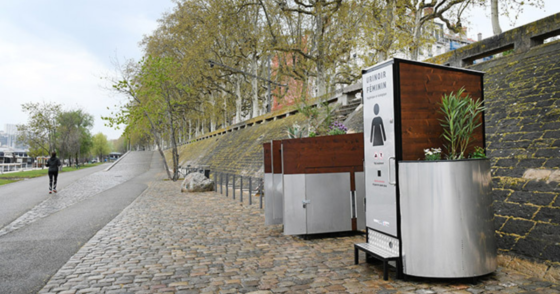
Scattered throughout the cities of France, public toilets allow anyone to relieve an urgent desire without spending a dime. But very often this street furniture comes under fire from critics: not clean enough, not numerous enough, not intimate enough… In order to offer residents better access to hygiene, the city of Lyon and the metropolis have decided to experiment with a park of 16 toilets of a new kind. Since the beginning of April, “ecological” and “inclusive” toilets have been installed with a threefold purpose: sanitary, ecological and egalitarian. explanation.
In collaboration with the Métropole, Lyon’s town hall has chosen to set up these new systems in areas “lack of sanitary facilities”since there was “technically impossible to install conventional toilets, due to lack of access to water and a sewage network or to the electricity grid”as reported France 3† Thus, from April to September, a total of 16 new toilets will be tested in the following areas: the banks of the Rhone, the Blandan Park, the place Louis Pradel and the Saint-Paul station district.
“Devirilize public space”
These new public toilets do not use water and are therefore called “dry toilets”. Seven of them are “male” urinals, seven others are reserved for women and two are reserved and accessible to people with reduced mobility. “Women’s urinals are designed and adapted to their anatomy so that they can urinate without touching the toilet bowl”specifies the city of Lyon. “These toilets respond to the desire to “devirilize” public space, that is, to ensure that it is not only aimed at housing men and boysexplains Mohamed Chihi, deputy of the city of Lyon in charge of safety, security and tranquility, questioned by the Lyon Tribune†
Urine turned into fertilizer
These toilets are not only inclusive, but also ecological on several levels: they do not consume water resources, are maintained by city officials who travel by bicycle, and above all they are part of a project to rehabilitate urine. The experiment determines that the urine collected in these toilets will be used for agriculture. Urine is rich in phosphorus and nitrogen, two essential resources for this sector, but in the process of depletion it will indeed be transformed to be used as a fertilizer, indicates France 3† “Ultimately, the goal is to find new channels to recover 100% of the collected urine”we can read on the website of the city of Lyon.
In terms of cleanliness, the town hall has thought of everything: a QRCode is placed on the entrance door of the huts to alert the cleaning services in the event of a problem. A user study will also be carried out for these toilets during the trial period.